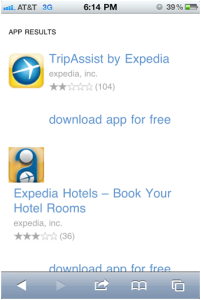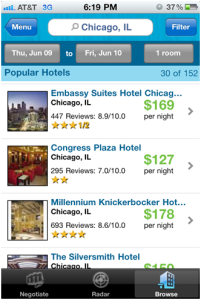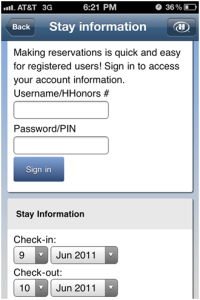It is no secret smart phones are on the rise. In fact Nielsen is predicting 50% of Americans will own a smart phone by the end of 2011. The mobile marketing platform is generally still new and presents an untapped opportunity for marketing and interacting with a tech savvy audience. A mobile phone is just that – mobile! An owner takes the phone everywhere. So how will the travel industry, more specifically hotels, be impacted by mobile search?
Every Trip Begins with Research
Most users search the destination area to book a flight or room. In fact, Google recently announced 19% of hotel-related keyword searches are conducted on mobile devices. Searches on a mobile phone are usually for an immediate need. A user is on the go looking for a quick solution: where to eat dinner, what time a movie is playing, where to book a hotel room, etc. According to a Google blog, 9 out of 10 searches on a smart phone results in an action; such as a call, in-store visit, or purchase. There is a high rate of conversion involved with mobile searches. Having a mobile website for a user to easily navigate is extremely helpful. Providing the option to click-to-call or send an email with one touch further facilitates the searcher in taking immediate action.
The Rise of the Mobile Travel App
Bing very recently unveiled a new feature of recommending apps from a given search query on a mobile phone. Essentially, a user would find the answer to their query in an app they can download to make the search simpler on a mobile device. In the screenshot below, a search for “hotels Chicago” on Bing resulted in a suggestion to download the Expedia app.
Apps are incredibly popular, and as Steve Jobs once commented, searches aren’t happening on browsers, they are happening through apps. Whether it is a brand app or online travel agency app, users are able to search for hotels in their destination, compare prices, and ultimately purchase a room. A brand app can also be useful for checking in to the hotel, looking up reservations, or managing a hotel loyalty membership. The below screen shots are of a search for “hotels Chicago”, on the left is Priceline results, and the right is a Hilton app to book a Chicago Hilton hotel night.
A typical traveler uses a smart phone not only to stay connected with friends and family back home via calling and texting, but also to learn and find places within the new destination. Local search apps like Urban Spoon, Google Places, or Around Me enable a user to find restaurants and local businesses in close proximity and get a snapshot of what the place is like.
Mobile Searches within Your Social Network
Many travelers also use smart phones to engage in social media activities. Visitors can check-in on sites like, Facebook, Foursquare and Yelp and share their experiences. In turn, this becomes a great form of word-of-mouth advertising. Visitors review the business and share it within their network. Google found 49% of travelers made their plan based on reviews and ratings of others. Reviews play an important role in helping the user make a decision on where to book. A hotel needs reviews, and can easily promote guests to leave their opinions by using their smart phones before they depart. A hotel can place QR Codes on posters on the property asking a guest to follow the code to a site to leave a review while the experience is still fresh. The QR code can also be used promote the hotel’s Facebook and Twitter pages by linking guests to a “like” and “follow” page. These mobile marketing tools can advance a hotel in the social media landscape and create more conversation around the brand. As already stated, reviews of a hotel are a major factor in a searcher’s decision process. It is an on-going cycle as one guest leaves a review, another user is searching on a smart phone for their next trip.
In essence, mobile marketing is a multi-faceted platform in which a user engages several different ways with a business. From calling to texting, search to apps, social media and reviews to offline actions there are so many ways to captivate a smart phone user to bring attention to your business. With the ever-growing popularity of smart phones, now is the time to take action and get involved with mobile marketing tactics.







